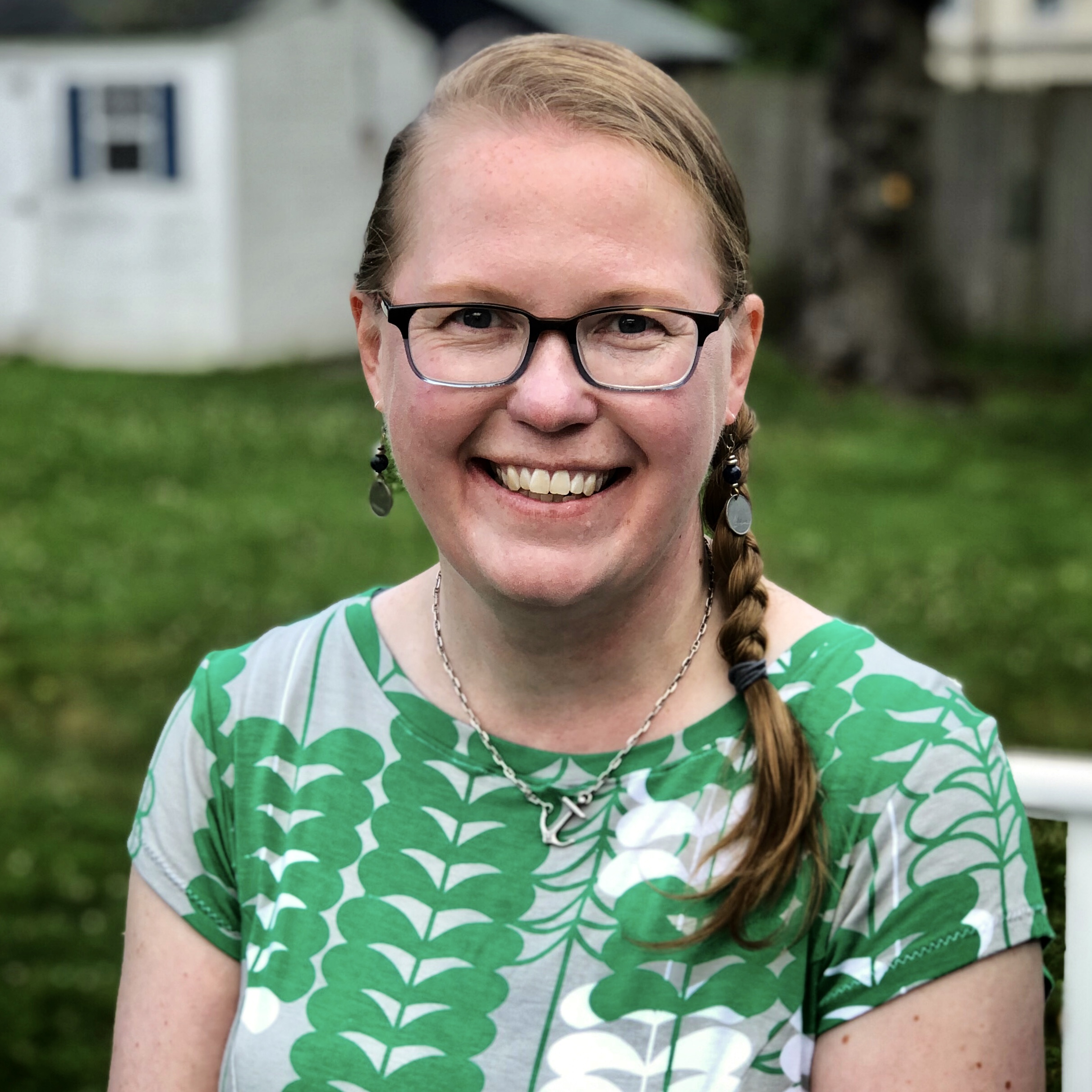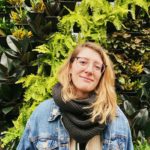Review by Emily Holland
Share the Wealth
Maureen Thorson
Veliz Books
 In Maureen Thorson’s newest collection, Share the Wealth, readers embark on a journey overflowing with images and emotion. From poems grounded in natural forest landscapes, to those that dive deep into the relationships between the speakers and their pasts—or futures—Thorson leans on striking similes and piercing images to fully fold the reader into the worlds of her speakers. Deeply specific moments—such as the untimely hangover in “Tomorrow, I’ll Tell People It Was Food Poisoning,” the speaker becoming entangled in a shag carpet in “I Love Your Teeth,” or the speaker remembering being taught how to plant a cucumber in “Beautiful Now”—become universal through their deft imagery and willingness to share, as the title of the collection suggests, a wealth of emotion and personal revelations within the careful pacing of various narrative threads.
In Maureen Thorson’s newest collection, Share the Wealth, readers embark on a journey overflowing with images and emotion. From poems grounded in natural forest landscapes, to those that dive deep into the relationships between the speakers and their pasts—or futures—Thorson leans on striking similes and piercing images to fully fold the reader into the worlds of her speakers. Deeply specific moments—such as the untimely hangover in “Tomorrow, I’ll Tell People It Was Food Poisoning,” the speaker becoming entangled in a shag carpet in “I Love Your Teeth,” or the speaker remembering being taught how to plant a cucumber in “Beautiful Now”—become universal through their deft imagery and willingness to share, as the title of the collection suggests, a wealth of emotion and personal revelations within the careful pacing of various narrative threads.
The book begins looking inward, with a self-portrait poem in which the speaker, self-identified as one of the “bookshop ladies,” dives into her own complex imagination: she sees the image of Martin Luther on a book cover and wonders if he is actually looking at, and thinking about, her, while she is thinking about a scene in the film Andrei Rublev, which leads her to think about a Bruegel painting. Like the layers of an oil painting, each part of the speaker’s imagination covers up what came before. “I’ve lived a life that disappears,” writes Thorson. This poem sets the stage for the collection’s various explorations of image, history, and external influences, culminating in the final stanza:
but I’m no Luther, no Rublev,
not even Bruegel painting a scene.
I’m a dancer, a drinker, an unidentified groom
wondering if that red fleck outside the window
is supposed to be sunrise
or a pitch-dripping arrow,
the first cow gone up in flame.
Here, Thorson gives us the speaker as observer and as actor. Her speakers, across the collection, are never stagnant. They shift positions within the frames of the poems, change angles and refract images like prisms. In the poem “No Myth,” the speaker dives into a memory of herself and her sister, each pretending to be a pegasus, complete with DIY yarn manes and tails. This poem is one extended sentence, each line fully enjambed, building momentum as image after image cascades down the page. The cumulative effect is one of soft reflection—when the poem comes to a close in the last line, the final image is of the mother watching the girls “as they fly in pink shorts up the stairs.” What began with a declarative statement from the speaker in line one—“I am a pegasus”—ends in a glimpse of mature transformation, perhaps from subtle time shift from the present action to more of a living memory across the poem itself.
Across the collection, Thorson utilizes poetic forms in imaginative ways. A haibun becomes a vehicle for time travel; the titular poem itself is a sonnet reflecting on death and one’s legacy. A Basho-inspired golden shovel—a form created by the poet Terrance Hayes in which the last word of each line, when read top to bottom, creates a poem or line by another author—simply overflows with abundance. The domestic comes into direct conflict with the natural, as the speaker of “After Basho” yearns for the exterior landscape of trees in a time of mourning, but instead is brought food from their “dear ones.” The poem continues:
But they couldn’t take the idea in—
they brought me salads
they brought me soups—
they piled dishes everywhere, everywhere
The speaker then turns their attention to the cherry tree, whose “blossoms,/ like tiny tortillas flex, and fill and fall.” How poignant, this sudden shift in the simile, which returns the poem to the realm of the food that perhaps was on those very same dishes before. The blossoms at the poem’s end becoming their own source of nourishment here, completely enveloped in the image of the tortilla, which, when filled, provides sustenance. The falling cherry blossoms sustain the speaker in a similar way, and give them all they need.
Images, in these poems, are not purely visual. Thorson employs incredible moments of sound play in lines like “in gulping, golden gallonfuls.” from the poem “Damned” or “Skinflints slinging dimes/ at the poor don’t rate our sympathy; their slender charity—” in the title poem “Share the Wealth.” These sound-images reverberate in the repetitive nature of alliteration. Other poems employ anaphora, with extended repetitions creating complex composite images, as seen at the end of the poem “No Word For Blue”:
the sky-color,
the sea-color,
the stone-color,
the color of eternity,
the color of shell beads,
the color I remember
of my rivals’ eyes,
of my dress in the temple,
of the mirage of your earrings,
of the teeth of our laughter,
of the night we once met in,
of the ink in the diaries
of men who never returned.
And this repetition is itself a form of sound play, as well, with the echoing start of each line reverberating through the following colors or images.
As readers go deeper into these poems, they can feel the passage of time, from the first section, flowing through memory and time travel, to the second, which gives us poems that move from January to June, and other seasons, and finally to the third section where poems reflect on aging, death, and what the speaker “would rather be.”
Thorson gives us much more than words with this collection. Rather, we see a whole experience, perhaps one life refracted through these different speakers, or perhaps many, as Thorson’s piercing images reveal imaginative possibilities. In her poems, Love and Death[love and death] are personified, a Museum of Apologies can charge $20 admission, and even God’s silence is given explanation. These poems are fitting to fall under the title of Share the Wealth because Thorson is sharing so much here: emotion, imagery, observation. Here lies a wealth of poetic imagination to be poured back—as the speaker of “Share the Wealth” says—“into the dream from which we came.”
Click to Visit More from and on Maureen Thorson
—Reading at Welcome to Boog City 15.5 Arts Festival
· On March 8, 2022 at 7:30 p.m. eastern, Veliz Books will host a virtual launch reading for Maureen Thorson’s new poetry collection, Share the Wealth. To obtain the Zoom link and other event details, visit fb.me/e/1bdLnQff9.
· On March 16, 2022 at 6:00 p.m. eastern, Maureen Thorson will read in-person with Meghan Sterling and Dawn Potter for the inaugural 3×3 reading series hosted by Lily Greenberg at Trinity Episcopal Church, 580 Forest Ave., Portland, Maine. For more info: https://lily-greenberg.com/3×3-poetry-series/.
 EMILY HOLLAND (she/they) is a lesbian writer living in Washington, D.C. She received her M.F.A. from American University, where she was the editor-in-chief of FOLIO. Her poems have appeared or are forthcoming in Black Warrior Review, Nat. Brut, Homology Lit, and Wussy, among others, and she is the author of the chapbook Lineage (dancing girl press). Her work has received support from the DC Commission on the Arts and Humanities and Sundress Academy for the Arts. She is the editor of America’s oldest poetry magazine, Poet Lore, published by The Writer’s Center. www.emily-holland.com
EMILY HOLLAND (she/they) is a lesbian writer living in Washington, D.C. She received her M.F.A. from American University, where she was the editor-in-chief of FOLIO. Her poems have appeared or are forthcoming in Black Warrior Review, Nat. Brut, Homology Lit, and Wussy, among others, and she is the author of the chapbook Lineage (dancing girl press). Her work has received support from the DC Commission on the Arts and Humanities and Sundress Academy for the Arts. She is the editor of America’s oldest poetry magazine, Poet Lore, published by The Writer’s Center. www.emily-holland.com
MAUREEN THORSON (www.maureenthorson.com) is the author of the full-length collections Share the Wealth (Veliz Books), My Resignation (Shearsman Books), and Applies to Oranges (Ugly Duckling Presse). She is the founder of NaPoWriMo, an annual project in which poets attempt to write a poem a day for the month of April. She lives in Maine.

